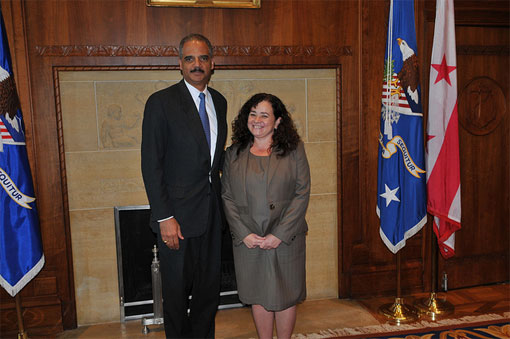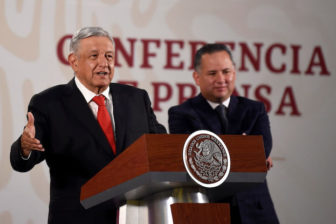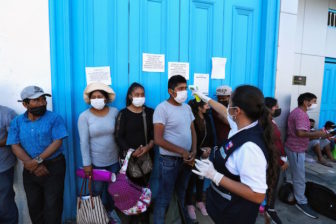Guatemala’s judicial system is on the upswing. In 2011, the Public Ministry made notable strides in the fight against organized crime and political corruption through the leadership of Claudia Paz y Paz—a new and competent attorney general who took over in December 2010—and the continued support of the United Nations sponsored Commission against Impunity in Guatemala (CICIG). President-elect Otto Pérez Molina, who assumes office on January 14, must ensure the continuity of these efforts.
Most visible is the crackdown on drug traffickers. Nestled up against Mexico’s southern border, a combination of geography and notoriously weak state capacity makes the country an ideal place for drug cartels to do business. These groups have linked up with homegrown criminal organizations and expanded operations in recent years, making Guatemala a major transshipment point for heroin, methamphetamines and cocaine destined for the United States (75 percent of U.S. bound cocaine now passes through Guatemala).
After decades of inaction, the Public Ministry is finally chipping away at these organizations. In just a year, it managed to capture five of the country’s 10 most wanted drug traffickers, including members of the powerful Lorenzana and Overdick clans. Several hundred others connected to the Zetas and the Sinaloa cartel were arrested, and a handful of homegrown thugs were extradited to the United States. By the end of 2011, public prosecutors had solved five times more cases than in 2007.
They also made significant progress in combating official corruption. Starting in her own office, Paz y Paz began a wholesale overhaul of the Public Ministry, writing up formal complaints and suspending and firing over 100 prosecutors. Most recently, in November 2011, authorities issued arrest warrants for Gloria Torres—the sister of former first lady and (brief) presidential candidate Sandra Torres—and two of her daughters for laundering over $3 million in government contracts from 2005 to 2010. The arrests sent a clear message about Paz y Paz’s independence from the administration of President Álvaro Colom and his Unidad Nacional de la Esperanza party just months before President-elect Otto Pérez Molina and his Partido Patriota take office.
Most remarkably, the attorney general has begun to take on crimes of the past from both sides of the political spectrum, investigating war crimes by both former military officers and guerrilla fighters during the civil war (1960–1996). While the gains here are less impressive than in other areas—only four ex-soldiers have been convicted so far—it is historic in Guatemala to see any investigation into abuses during the 36-year conflict. No perpetrator of any of the civil war’s 626 massacres had been prosecuted in a court of law until about a year ago. Now, Héctor Mario López Fuentes, a former military chief of staff, sits in jail while awaiting trial for allegedly ordering the murder of hundreds of Indigenous civilians.
Former army officers are pushing back. Last November, they began lobbying congress to pass a bill that would apply a blanket amnesty for those who fought in the war. The legislation, known as Law 3711, remains pending in congress while it is on holiday recess through next week.
Despite the many advances, the future of the country’s judicial sector remains uncertain. Many are worried that Pérez Molina may remove the two major forces behind the achievements: Paz y Paz and CICIG. Even if they are not ousted, their mandates will still expire in 2013 barring an extension by congress.
But it will be difficult for Pérez Molina to get rid of the attorney general and the UN body. The international community, and the United States in particular, has rallied behind them—making it clear that their departure could come with potential consequences. Secretary of State Hillary Clinton met with Paz y Paz twice in the past six months, and personally awarded her the International Crisis Group’s Pursuit of Peace prize in December. UN Secretary-General Ban Ki-moon issued statements stressing CICIG’s importance during a visit to Guatemala in March 2011 and at UN headquarters last month. Pérez Molina also would have to contend with domestic civil society, which has come to CICIG’s rescue a number of times over the past four years, and has even stronger ties to Paz y Paz, an academic and former think tank director.
Still, in a country where the impunity rate still hovers just above 95 percent (meaning less than five of every one hundred crimes are solved) much more needs to be done to build on—and then protect—the achievements made thus far. Congress has yet to pass the Law against Corruption in Public Administration (Law 4347)—part of a critical package of anti-corruption amendments to the penal code introduced in March 2009—and National Civil Police reform has stalled since Helen Mack left her role as commissioner just a week after Pérez Molina won the election last November. The outcomes of pending human rights trials, particularly those against General Héctor Mario López Fuentes and participants in the Plan de Sánchez massacre in 1982, are also important litmus tests for the judiciary.
But these first small steps have set the country on the right—if long—path toward stronger justice and more widespread respect for the rule of law. The Pérez Molina administration now faces the task of bringing them to the next level.







